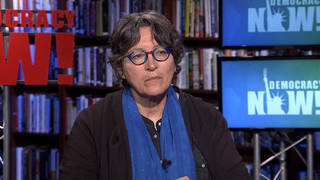
Related
Guests
- Baher Azmylegal director of the Center for Constitutional Rights.
In Virginia, a historic case against U.S. military contractor CACI brought by three Iraqi survivors of torture at the notorious Abu Ghraib prison in Iraq has ended in mistrial after the jury on Thursday failed to reach a unanimous verdict. The lawsuit against CACI — which was hired to provide interrogation services at Abu Ghraib — was first filed by the Center for Constitutional Rights in 2008. Since then, CACI repeatedly attempted to have the case dismissed. Plaintiffs Suhail Al Shimari, Asa’ad Zuba’e and Salah Al-Ejaili had accused CACI of conspiring to commit war crimes at Abu Ghraib. The three were subjected to sexual abuse and other forms of torture by interrogators, including electric shocks, exposure to extreme temperatures and death threats by their interrogators. We feature a 2014 Democracy Now! interview with Al-Ejaili and speak with Baher Azmy, attorney in the case and legal director of the Center for Constitutional Rights. Azmy notes the men were able to tell their story in a U.S. court even though the jury was ultimately confused by a complicated legal question in the case. “We got historical testimony that makes clear, I think, CACI’s responsibility for these clients’ harms,” says Azmy.
Transcript
AMY GOODMAN: This is Democracy Now!, democracynow.org, The War and Peace Report. I’m Amy Goodman.
In Virginia, a historic case against U.S. military contractor CACI — used to be known as CACI — brought by three Iraqi torture survivors at the notorious Abu Ghraib prison in Iraq has ended in mistrial, after the jury Thursday failed to reach a unanimous verdict. The lawsuit against CACI was first filed by the Center for Constitutional Rights in 2008. Since then, the company repeatedly attempted to have the case dismissed. The plaintiffs are Suhail Al Shimari, Asa’ad Zuba’e and Salah Al-Ejaili. They had accused CACI of conspiring to commit war crimes at Abu Ghraib. The three were subjected to sexual abuse and other forms of torture by interrogators.
We interviewed one of the plaintiffs, Salah Al-Ejaili, on Democracy Now! back in 2014, a decade ago. He talked about his time in solitary confinement at Abu Ghraib.
SALAH AL-EJAILI: [translated] These interrogations that happened every two or three days would last for an hour, an hour and a half or two hours, in this manner. The details of the interrogations were different. In some cases, they would bring dogs, then start the interrogation. In other cases, they’d put you in a place and throw cold water or hot tea on you, then start the interrogation. But, of course, all the interrogations were conducted while you were kept naked and hooded, and they’d ask you questions to which you answer. I stayed for 40 days in a solitary cell, and 70% of that time I was kept naked.
AMY GOODMAN: Salah Al-Ejaili was one of the plaintiffs in the case against the U.S. military contractor CACI for torture at Abu Ghraib.
For more, we’re joined here in New York by Baher Azmy. He is legal director of the Center for Constitutional Rights, representing the plaintiffs in this case.
Welcome back to Democracy Now!, Baher. Start off by talking about the significance of the mistrial and the importance of this case.
BAHER AZMY: Thank you, Amy, for paying attention to this case for over 15 years.
This is a historic human rights case. Say it’s among the many dozens, maybe even hundreds, of cases brought trying to challenge U.S. torture practices in U.S. courts. This is the first and only time torture survivors have come to United States court and been able to actually testify about what happened to them. And all three did and provided just heartbreaking and powerful testimony, that is a credit to their remarkable courage and resilience over these 15 years facing every obstacle that these powerful interests have put before them. But they were able to tell their story.
And even though the jury ultimately was not unanimous, what became clear is — you know, the jury would send out questions to the court periodically after the testimony was finished. That gave us pretty strong clues about what was holding them up. And what was very clear is, first, nobody seemed to question the reliability of their testimony or the fact that they in fact suffered torture or mistreatment. And nobody seemed to question the fact that CACI interrogators, CACI interrogators, were in a conspiracy with the military police, many of whom we know were court-martialed for the abuses at Abu Ghraib, and that that conspiracy existed between CACI interrogators and military police that produced the exact same harms that our clients suffered.
The mistrial ultimately turned on a legal question that was very, very confusing for the jurors. They asked about it three times in court, and ultimately revealed they can’t figure out what the meaning of this legal question is.
AMY GOODMAN: Explain.
BAHER AZMY: Yeah So, among the grab bag of deflections and defenses CACI has thrown out over the past 15 years, most recently they’ve invoked this, I don’t know, 18th century doctrine called the borrowed servant doctrine, which, in theory, suggests if an employer completely relinquishes control of their employees to another entity, even if their employees in that other entity do unlawful acts, you know, CACI would not be responsible. And the jury was confused about the level of control, because while CACI, of course, hired, was able to fire, discipline and supervise them — all of the indicia of employment — sure, they were performing work for the Army. And what the jury was not told is CACI would be liable if there is a kind of joint control.
So, some probably were confused and thinking, “Well, they’re following directions by the Army.” And the others, we actually know from the AP reporting that a majority of the eight jurors agreed with plaintiffs, recognized the obvious, which is these were CACI employees, subject to CACI employment policies, and therefore the company should be responsible for what their employees were doing.
AMY GOODMAN: Instead of?
BAHER AZMY: Instead of nobody being responsible. I mean, this just means that because, you know —
AMY GOODMAN: I mean, they were basically working for the U.S. military, is that right?
BAHER AZMY: They were working for the U.S. —
AMY GOODMAN: Doesn’t this give governments enormous deniability, because they can order people what to do, they work for a subcontractor —
BAHER AZMY: Yeah.
AMY GOODMAN: — and then it’s a no man’s land?
BAHER AZMY: It is a no man’s land. And I think that the way that the court structured the legal theory, it would make any government contractor theoretically immune, because any government contractor loans out their employees to the client, the United States government, to perform work. And yeah, that exacerbates this accountability gap, which, as I said before, recall, military police officers, the co-conspirators with CACI interrogators, were court-martialed and punished and served time. They testified in this trial. And like the military generals, two of them, who did reports in 2004, these military police fingered CACI interrogators and said, “Yeah, they told us to treat detainees like shit to soften up detainees for interrogations, and we were in a brotherhood with them and carried out their instructions, that led to these abuses.”
AMY GOODMAN: OK, we’re talking about a scandal that broke 20 years ago, those famous pictures that came out, for example, in The New Yorker magazine, Sy Hersh’s piece. You’ve been on this case for over 15 years. How come this took so long?
BAHER AZMY: Well, I think when you are litigating against a massively resourced corporation with $8 billion, they will do everything to delay justice as long as possible. And they’ve tried. They filed over 24 motions to dismiss. In many cases, there are just one or two. We’ve been to the court of appeals five times. They’ve tried to get Supreme Court review. That’s their effort to block any kind of accountability.
And what they could not stop is three courageous human beings who stood up against every obstacle and told their story in a U.S. court in a breathtaking, compelling manner. And while we didn’t get a judgment from a jury, we got historical testimony that makes clear, I think, CACI’s responsibility for these clients’ harms.
AMY GOODMAN: So, tell us about these individuals, these three men. We heard one man describing a part of his experience. Talk about what they endured at Abu Ghraib and why they were even imprisoned.
BAHER AZMY: Well, in the chaos following the invasion, the United States swept up thousands of Iraqi citizens and detained them in detention camps all over Iraq. The one we know most about is Abu Ghraib, a notorious torture facility from the Saddam regime. And in that chaos, there was a command vacuum. CACI interrogators sort of took over and started ordering MPs, military police, who were basically prison guards, to abuse detainees in advance of the interrogations CACI would undertake.
And our clients suffered the kinds of abuses everyone suffered: beatings, forced nudity, sexual humiliation, religious degradation. And they talked so powerfully about what that experience was to them. Salah, who we saw, talked about what it was like to be chained and naked among so many other naked men and not being able to make eye contact with others because that would just exacerbate their shame. Asa’ad talked about the first night their being chained, hooded, naked in a freezing isolation cell, crying, crying out for help, and having to urinate on himself because they deliberately would not come to him. Suhail, who is a middle school principal, talked about his forced nudity and the indignity. He said, “I am a principal. I am a man.” And to suffer that level of degradation was really, really painful for them. And a just enormous credit to their courage to come to a United States court and speak about it.
AMY GOODMAN: And the key testimonies of the two retired Army generals who investigated Abu Ghraib?
BAHER AZMY: The key testimony was from two generals of the United States Army who were sent to Iraq to investigate the scandal: Major General Antonio Taguba, who testified live in court and implicated CACI and implicated their supposed star witness, “Big Steve” Stefanowicz, whose footprints were all over Abu Ghraib, and Major General George Fay, who also did an investigation and also implicated CACI. So, that was really the core of the testimony, and as well as testimony from actual military police officers, the co-conspirators, who said that CACI was instructing them to abuse detainees. And all of that painted this picture that CACI interrogators were responsible for these abuses, subject, ultimately, to this confusing defense that I think tripped up the jury. But the evidence was very, very powerful regarding CACI’s responsibility.
AMY GOODMAN: It’s hard to believe that the U.S. military prison at Guantánamo still is holding dozens of men. But if you can talk about that connection between Guantánamo and Abu Ghraib, Geoffrey Miller, the general who is in charge of Guantánamo, then sent to Abu Ghraib to “Gitmoize” it?
BAHER AZMY: Yeah. I mean, I think there, in 2002 to 2004, we know of the kind of systems of abuse that were in Guantánamo. And the commander at Guantánamo was sent to Iraq to, quote, “Gitmoize” it and continue to abandon law, the Geneva Conventions, in both places, even though it was clear that in Abu Ghraib, the U.S. military made clear the Geneva Conventions applied. CACI’s code of conduct required them to follow U.S. military regulations, including the Geneva Conventions. And all of that was abandoned in this sort of like endless cycle of abuse and dehumanization.
AMY GOODMAN: Finally, what does mistrial mean? And how especially do these three men who brought the complaint and the case against CACI, against CACI, feel about the mistrial?
BAHER AZMY: So, the mistrial follows because even after eight days of deliberation, this jury of eight eventually told the court, “We have tried, but we cannot agree.” And so the court let them go and said that for this trial, it is a mistrial, but that we are allowed to retry the case — and have every intention of doing so.
Our clients were, you know, deeply disappointed, of course, but I think they feel really proud of what they accomplished and the partnership we’ve had with them and the support that we brought, and this remarkable law firm Patterson Belknap brought, to tell their story in court. And, you know, as we say in trial law, they’ll have another opportunity to do so and get the judgment they’ve been pursuing for 15 years.
AMY GOODMAN: Baher Azmy, legal director for the Center for Constitutional Rights, representing the Abu Ghraib plaintiffs in their case against CACI, or CACI. For the last 20 years, he’s been part of a team challenging the U.S. government over the rights of Guantánamo prisoners, discriminatory policing practices, government surveillance, the rights of asylum seekers, and accountability for victims of torture, and these three Abu Ghraib prisoners. This is Democracy Now! I’m Amy Goodman. Thanks for joining us.












Media Options